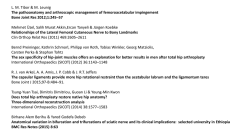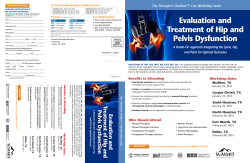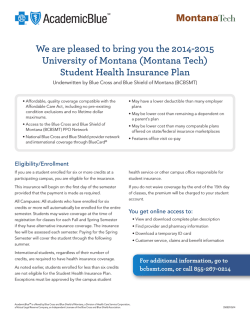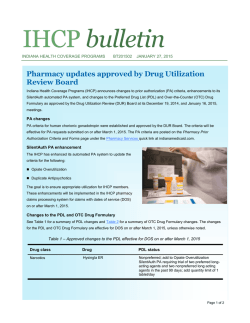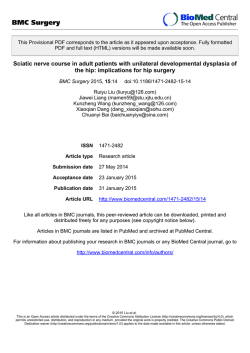
BT201503 - Indiana Medicaid
IHCP bulletin INDIANA HEALTH COVERAGE PROGRAMS BT201503 JANUARY 27, 2015 FSSA announces the “NEW” Healthy Indiana Plan! Coverage for qualifying Hoosiers will start effective Feb. 1, 2015 The Indiana Family and Social Services Administration (FSSA) announces approval of its Healthy Indiana Plan (HIP) 2.0 waiver application by the Centers for Medicare & Medicaid Services (CMS). Accordingly, the Indiana Health Coverage Programs (IHCP) will implement the new HIP beginning February 1, 2015. The new HIP program expands coverage to all eligible Hoosiers ages 19-64 with incomes up to and including 133% of the federal poverty level (FPL)1. It also incorporates the following members already enrolled in other IHCP programs: All current HIP members Nondisabled low-income parents and caretakers now enrolled in Hoosier Healthwise 19- and 20-year-old members now enrolled in Hoosier Healthwise Qualifying members now enrolled in the Family Planning Eligibility Program Members receiving coverage for family planning services only who are eligible for the new HIP program will transition from their current limited coverage option to full benefits under the new HIP. Governor Mike Pence announces HIP 2.0 approval at press conference Tuesday, January 27, 2015 Coverage for members transitioning to the new HIP program will be effective February 1, 2015. Current HIP, Hoosier Healthwise, and family planning enrollees will begin receiving notice of new HIP enrollment options in mid- to late January 2015. The recipient identification numbers (RIDs) for current HIP members who transition to the new HIP program will not change. Providers can continue to use the RID number for eligibility verification. All members in new HIP plans will have a $2,500 deductible and a Personal Wellness and Responsibility (POWER) Account similar to a health savings account, which will be used to pay the first $2,500 in claims for covered services. After the deductible is met, benefits will be paid by the member’s plan. Preventive care and maternity services are not subject to deductibles and will not be deducted from the member’s POWER Account balance. Both the State and the member will contribute to the POWER Account to ensure that it is fully funded. By June 2015, all HIP members will have POWER Account debit cards that will allow them to use their POWER Account funds to pay the deductibles for approved services at the point of service. After the deductible is met, benefits will be paid without an annual or lifetime benefit cap. New HIP plans The new HIP program includes four distinct plans and two cost-sharing structures: HIP Plus is the preferred plan available to most HIP-eligible individuals and provides the best value for members. Members pay affordable monthly contributions of approximately 2% of their incomes into their POWER Accounts. 1 Income limit for HIP is 133% of the FPL plus a 5% disregard, which is approximately equivalent to an income limit of 138% FPL. Page 1 of 5 IHCP bulletin BT201503 JANUARY 27, 2015 Enrolled spouses may split this contribution amount. The minimum contribution is $1. Members in HIP Plus do not have to make copayments for doctor visits, pharmacy services, or hospital admissions. Graduated copayments are required for inappropriate use of the emergency department (ED) only. HIP Plus members receive a full commercial-market benefit package that includes coverage for vision and dental services; bariatric surgery, temporomandibular disorder (TMJ) treatment, and increased visit limits for physical, speech, and occupational therapies. HIP Plus members also receive enhanced pharmacy services, including mail order, 90-day supplies for maintenance drugs, and medication therapy management. Members who do not make monthly contributions to their POWER Account will not be eligible to participate in HIP Plus. Noncontributing members with incomes over 100% of the FPL 2 will be locked out of the program and not eligible to reenroll for six months. This reenrollment lockout will not apply to members who are medically frail or to those residing in a domestic violence shelter or in a state-declared disaster area. Noncontributing members with incomes at or below 100% of the FPL will move to the HIP Basic plan. For this reason, it is imperative that all members be encouraged to stay current with their POWER Account contributions. HIP Basic is the default plan available only to HIP members with incomes at or under 100% of the FPL, who lose HIP Plus eligibility, because the member did not make the required POWER Account contribution. HIP Basic members have coverage for limited commercial-market benefits that do not include coverage for vision, dental, bariatric surgery, TMJ treatment, or enhanced pharmacy services, including mail order, 90-day supplies for maintenance drugs, and medication therapy management. HIP Basic members have fewer allowed visits for physical, speech, and occupational therapy services. In addition, HIP Basic members are assessed a copayment for each service received or prescription filled. HIP Basic copayment amounts are set at the CMS-allowable copayment limits of $4 for office and other outpatient services, between $4 and $8 for each prescription filled, and $75 for each inpatient stay. Maternity services, preventive services, family planning services, and appropriate use of emergency services are not subject to copayments. HIP State Plan is available to individuals who qualify as low-income parents and caretakers, low-income 19- and 20- year-olds, and individuals with serious and complex medical conditions deemed "medically frail.” This option guarantees that these individuals have access to comprehensive Indiana Medicaid State Plan services, including nonemergency transportation to medical appointments. Individuals with chronic mental, behavioral, or physical health conditions have access to these benefits if they qualify as medically frail. More detailed information regarding the conditions that qualify someone as medically frail and the process for verifying medically frail status will be provided in a future IHCP bulletin. Members receiving HIP State Plan coverage will be enrolled in HIP State Plan – Plus if they make monthly POWER Account contributions. If the member does not make his or her monthly contribution for HIP State Plan – Plus and the member’s income is at or below 100% of the FPL, the member will be enrolled in HIP State Plan – Basic, which requires copayments. Members whose incomes are over 100% of the FPL who do not make their monthly contributions will be subject to a six-month lockout unless they are medically frail or are residing in a domestic violence shelter or in 2 Individuals with incomes over 100% percent of the FPL will be subject to lockout if they do not pay their POWER Account contributions. Page 2 of 5 IHCP bulletin BT201503 JANUARY 27, 2015 a state-declared disaster area. There are no benefit differences between the two HIP State Plan options; however, individuals are required to either make contributions to their POWER Accounts (HIP State Plan – Plus) or pay copayments (HIP State Plan – Basic). HIP Link will allow HIP-eligible individuals who have access to qualifying employer-sponsored insurance plans to enroll in their employer’s plan and receive assistance paying the premiums and cost sharing associated with their employersponsored plan. HIP Link will be implemented at a later date and more information will be provided in a future IHCP bulletin. All HIP members, regardless of plan, will be subject to copayments if they use the emergency department (ED) for nonemergency services. The copayment will be $8 for the first instance and $25 for each subsequent instance. Members may have their copayments waived if they call the 24-hour nurse hotline prior to visiting the ED and are advised to go. HIP members will be informed of the 24-hour nurse hotline number by their health plan (Anthem, MDwise, or MHS). Members with emergency conditions that meet the prudent layperson standard or who are admitted to the hospital within 24 hours of their ED visit will not be responsible for paying the ED copayment amount. HIP member enrollment There is no longer a separate state application process for HIP. Interested individuals may apply for the new HIP program using the IHCP Indiana Application for Health Coverage. For HIP members, HIP Plus coverage will begin the first day of the month in which they make their first POWER Account payment. For members who do not make their POWER Account contributions, and are transitioned to HIP Basic, coverage will begin the first day of the month in which the member’s POWER Account payment period expires. The member’s POWER Account payment period expires after 60 days. Managed care delivery system and reimbursement All HIP members will be assigned to a managed care entity (MCE) – Anthem, MDwise, or MHS – as is done under the current HIP program. The MCEs may require that many services be provided by in-network providers only. To receive reimbursement for services rendered to HIP enrollees, an IHCP provider should enroll as an in-network provider with one or more of the MCEs. All benefits in the new HIP program, with the exception of Medicaid Rehabilitation Option (MRO) services, are provided through the MCEs. This includes dental and pharmacy services, which were previously carved out of HIP. The MCEs are responsible for providing coverage for these benefits and issuing payment to providers. MRO services available to qualifying HIP State Plan members are carved out and reimbursed as fee-forservice claims. HIP members can change their health plan selection before making their first POWER Account contributions, during their redetermination period, or for just cause. Just cause includes: Receiving poor quality care Failure of the insurer to provide covered services Page 3 of 5 IHCP bulletin BT201503 JANUARY 27, 2015 Failure of the insurer to comply with established standards of medical care administration Lack of access to providers experienced in dealing with the enrollee’s healthcare needs Significant language or cultural barriers Corrective action levied against the insurer by the FSSA Limited access to a primary care clinic or other health services within reasonable proximity to a member’s residence A determination that another MCE’s formulary is more consistent with a member’s existing healthcare needs Other circumstances determined by the FSSA or its designee to constitute poor quality healthcare coverage Just-cause transfers are available to members who have attempted to work with their plan to resolve issues and are subject to approval by the State. To change health plans, or for any questions regarding plan transfers, members may call 1-877-GET-HIP-9 (1-877-438-4479). Reimbursement for most covered HIP benefits will continue at 100% of the current Medicare rate or 130% of the Medicaid allowable amount if a Medicare rate does not exist. Facility charges for individuals who qualify as low-income parents and caretakers and 19- and 20-year-olds enrolled in HIP State Plan will be reimbursed at the current Medicaid rates. As is the case under the current HIP program, hospitals will receive a supplemental payment through the Hospital Assessment Fee (HAF) program. Where a copayment applies, reimbursement to providers will always be reduced by the amount of the copayment due. The Eligibility Verification System will provide information on the member’s copayment obligation. HIP member cards will also provide a toll-free number to call to determine if the member owes a copayment, the amount of the copayment, and rules for collection at the time of service. Additional information for providers explaining the impact of the new HIP program is outlined in the IHCP Provider Q&As attached to this bulletin. Future publications will provide more in-depth details about the following: Updated HIP benefits, including vision, dental, and pharmacy benefits Updated policy on HIP member options for pregnant members Qualifying for and verifying “medically frail” status Information on HIP Link HIP dental benefits to be administered by DentaQuest, LLC Dental benefits under the new HIP will be administered by DentaQuest, LLC on behalf of all three HIP MCEs. To allow dental providers adequate time to become credentialed and contracted with DentaQuest, dental services may be provided by any IHCP provider for the first 90 days of the new HIP program. Effective May 1, 2015, IHCP dental providers must be credentialed and contracted with DentaQuest to receive reimbursement for services provided to HIP members. Page 4 of 5 IHCP bulletin BT201503 JANUARY 27, 2015 All claims and prior authorization (PA) requests for dental services to HIP members must be submitted directly to DentaQuest for dates of service (DOS) on or after February 1, 2015. For information about claims submission, PA requests, and the credentialing and contracting process, providers should contact DentaQuest Provider Services at 1-855453-5286. Paper claims and PA requests should be submitted to: DentaQuest of IN – Claims 12121 N. Corporate Parkway Mequon, WI 53092 Electronic Claims should be submitted via: Clearinghouse – Payer ID CX014 (include address above on electronic claims) After providers are credentialed and contracted with DentaQuest, claims and PA requests can be submitted securely online via the DentaQuest Provider Portal at dentaquest.com. QUESTIONS? If you have questions about this publication, please contact Customer Assistance at 1-800-577-1278. COPIES OF THIS PUBLICATION If you need additional copies of this publication, please download them from indianamedicaid.com. SIGN UP FOR IHCP EMAIL NOTIFICATIONS To receive email notices of IHCP publications, subscribe by clicking the blue subscription envelope here or on the pages of indianamedicaid.com. TO PRINT A printer-friendly version of this publication, in black and white and without graphics, is available for your convenience. Page 5 of 5 IHCP Provider Q&As New Healthy Indiana Plan (aka “HIP 2.0”) General provider impact Q: How does the new HIP program affect providers? A: The new Healthy Indiana Plan (HIP) program may affect healthcare providers by: Increasing the number of individuals covered: HIP is expected to enroll 388,000 members by January 2016. Increasing member benefits: HIP Plus provides coverage for additional services, compared to the current HIP program. For example, HIP Plus members will have vision and dental benefits and will be allowed additional physical, speech, and occupational therapy visits. Implementing copayments for some members: HIP members who do not pay their monthly Personal and Wellness Responsibility (POWER) Account contributions and who default to the HIP Basic plan will have copayments assessed for most services received. Provider reimbursement will be reduced by the amount of the copayment. To determine if a member owes a copayment, consult the Eligibility Verification System (EVS) or call the telephone number on the HIP member card. All copayments should be collected at the point of service. Q: Who is eligible to provide services to HIP members? A: IHCP-enrolled providers may be reimbursed for rendering services to HIP members, subject to the rules and restrictions of the member’s managed care entity (MCE). All HIP members are assigned to a MCE ‒ Anthem, MDwise, or MHS. The MCEs may require services be provided only by in-network providers. All IHCP providers are encouraged to enroll and become in-network providers with one or more of the MCEs. Q: How are members assigned to an MCE? A: IHCP members enrolled in managed care who transition to the new HIP will keep their current MCEs. Newly enrolling members may choose their MCE on the Indiana Application for Health Coverage or at any point before making their first POWER Account contributions. Members who do not select an MCE will be auto-assigned to an MCE. Members may change MCEs prior to making their first POWER Account payment, at their annual redetermination, or for just cause by calling 1-877-GET-HIP-9 (1-877438-4479). Q: What benefits are covered through the MCEs? A: In the new HIP, most services, including dental and pharmacy services, will be covered through the MCEs. The MCEs will be responsible for providing coverage for these services and issuing payment to providers. Medicaid Rehabilitation Option (MRO) services available to qualifying members under the HIP State Plan option will be carved out and reimbursed by the IHCP on a fee-for-service basis. 1 of 8 Conversion to the new HIP for current members Q: Are current HIP or IHCP members required to reapply for HIP to continue coverage? A: Current HIP and other IHCP members are not required to reapply. These members are being converted automatically to the new HIP program and will begin receiving letters from the IHCP about their new HIP coverage options in mid- to late January 2015. All current HIP members and individuals on the HIP waitlist will receive letters detailing their coverage options and will begin a 12-month benefit period in HIP. Current IHCP members who are low-income parents and caretakers and 19- and 20-year-olds enrolled in Hoosier Healthwise, as well as those enrolled in the Family Planning Eligibility Program, who are now eligible for HIP, will also receive information on HIP coverage options. All current HIP and Hoosier Healthwise members transitioning to the new HIP program will have seamless coverage through the transition. Individuals on the HIP waitlist and IHCP members receiving family planning services only will need to complete IHCP verifications and pay their initial POWER Account contributions to complete enrollment in HIP. Q: What changes can my current HIP patients expect when they transition to the new HIP? A: Individuals now enrolled in HIP will continue coverage without interruption under the new HIP. Those members who continue to pay POWER Account contributions will begin to receive HIP Plus benefits effective February 1, 2015. For most of these members, their new monthly POWER Account contribution amount will not change from their current HIP contribution amount. Current HIP members will participate with the same MCE, and the MCE will invoice the member for the monthly POWER Account payment. Members who currently have $0 POWER Account contributions will receive HIP Basic benefits but will have the opportunity to move to HIP Plus coverage by making their POWER Account contribution. Q: What changes can my Hoosier Healthwise patients expect when they transition to the new HIP? A: If you have patients who are nondisabled low-income parents or caretakers or 19- and 20- year-olds currently covered by Hoosier Healthwise, these individuals will transition to the new HIP effective February 1, 2015. These members will receive letters informing them of this change. Benefits provided for this group will not change, and members will continue to be served by the same MCE; however, they will have different cost-sharing obligations. These members will be asked to a pay monthly amount to their POWER Accounts to participate in HIP Plus, or they will be enrolled in HIP Basic, which will require copayments at the point of service each time they receive care. Q: What changes can my Family Planning Eligibility Program patients expect when they transition to the new HIP? A: Members currently eligible under the Family Planning Eligibility Program, who become eligible under the new HIP program, may enroll. These members may be asked to verify eligibility information and will be advised to select a health plan by calling 1-877-GET-HIP-9 (1-877-438-4479). To begin receiving benefits under the new HIP without a gap in coverage, these members must make their first POWER Account payment to their MCE. If current family planning-only members have incomes at or under 100% of the federal poverty level (FPL) and do not make their POWER Account contributions, they will receive HIP Basic benefits. Because these members are now eligible for the new HIP, they may not continue their family planning-only coverage. Coverage of family planning services is included without cost sharing under all new HIP coverage options. 2 of 8 Q: Will my patients who currently have coverage through the federal Health Insurance Marketplace transition to the new HIP? A: Individuals who have coverage through a Health Insurance Marketplace plan who are now incomeeligible for the new HIP program will need to transition to HIP coverage. These individuals will receive notification from the State that they need to update their marketplace account to ensure that they are eligible to transition to the new HIP. They may also receive notification from their marketplace plan. These individuals will not need to complete an IHCP Indiana Application for Health Coverage to enroll in HIP if they update their marketplace account, but they may need to provide certain IHCP verifications. Individuals eligible for the new HIP who do not update their marketplace accounts and remain enrolled in the marketplace may be required to pay the Internal Revenue Service back for part of any premium subsidies they received. To avoid financial penalties, all individuals currently enrolled in the federal Health Insurance Marketplace who think they may be eligible for the new HIP should be encouraged to log on to their marketplace account at healthcare.gov or call the federal marketplace at 1-800-318-2596. New HIP coverage Q: How do I know if someone is eligible for the new HIP program? A: You will verify if a member is eligible for the new HIP through the standard eligibility verification processes. Eligibility will be shown as Package H and identify the HIP benefit package – HIP Plus, HIP Basic, or HIP State Plan. Please refer patients looking for information on their HIP eligibility to the Division of Family Resources at 1-800-403-0864. Q: What benefits are offered under the new HIP? A: The new HIP provides members with three benefit plans: HIP Plus is the preferred plan available to HIP-eligible individuals: It offers the best value for members through a comprehensive commercial-market benefits package that includes vision and dental coverage. To be eligible, members must pay low monthly contributions toward their first $2,500 of covered health services. Contribution amounts are indexed to approximately 2% of monthly income and may be as low as $1 per month. No copayments are required when visiting doctors or filling prescriptions. HIP Basic is the fall-back program for lower-income individuals who do not make their POWER Account contribution. HIP Basic covers the essential health benefits with a commercial-market package but does not cover vision and dental services. Members pay copayments for most healthcare services, with payments ranging from $4 to $8 per doctor visit or prescription filled to $75 per hospital stay. These copayments can make HIP Basic more expensive than HIP Plus. HIP State Plan is available to nondisabled low-income parents or caretakers, and low-income 19and 20-year-olds, and provides coverage for benefits at least equivalent to the current coverage provided to these groups through Hoosier Healthwise, including coverage for nonemergency transportation to medical appointments. Confirmed “medically frail” members, those with chronic mental, behavioral, or physical health issues, as well as members undergoing initial medically frail screening, will also be able to access HIP State Plan benefits. Members enrolled in HIP State Plan 3 of 8 will have cost-sharing obligations either through POWER Account contributions (HIP State Plan ‒ Plus) or copayments (HIP State Plan ‒ Basic). Please see the following table for more information about benefit differences among the new HIP plans. All benefits covered, with the exception of Medicaid Rehabilitation Option (MRO) services, are provided through the MCEs. All HIP plans offer the essential health benefits required by federal law. Table 1 – HIP plan benefits Benefits HIP Plus HIP Basic HIP State Plan* Essential Health Benefits Ambulatory (Doctor visits) Covered – Includes coverage for temporomandibular joint (TMJ) disorders; 100-visit limit for home health Covered – No TMJ coverage; 100-visit limit for home health Covered – Includes TMJ coverage and chiropractic services; no home-health limit Emergency Covered Covered Covered Hospitalization Covered – Includes bariatric surgery Covered – No bariatric surgery Covered – Includes bariatric surgery Maternity Covered Covered Covered Mental health Covered Covered Covered Laboratory Covered Covered Covered Pharmacy Covered – Additional pharmacy services provided including 90-day supply, mail order, medication therapy management Covered – Additional pharmacy services not provided Covered –Additional pharmacy services provided in HIP State Plan – Plus Rehab and habilitation Covered – 75-visit annual limit for physical, speech, and occupational therapies; 100-day limit for skilled nursing facility Covered – 60-visit annual limit for physical, speech, and occupational therapies; 100-day limit for skilled nursing facility Covered – Requires prior authorization; no annual limit for physical, speech, and occupational therapies; no skilled nursing facility limit Preventive Covered Covered Covered Pediatric Early and Periodic Screening, Diagnosis, and Treatment (EPSDT) services covered for 19- and 20-year-olds Other Benefits Covered Adult vision Covered Not covered Covered Adult dental Covered – Limited to two cleanings per year and four restorative procedures Not covered Covered 4 of 8 Benefits HIP Plus HIP Basic HIP State Plan* Transportation Not covered Not covered Covered Medicaid Rehabilitation Option (MRO) Not covered Not covered Covered Pregnancy-only Additional benefits for pregnant women, including transportation and chiropractic services Additional benefits for pregnant women, including transportation, vision, dental, and chiropractic services Pregnant women receive access to all pregnancyonly benefits on HIP Plus or HIP Basic plan and full state plan benefits. *Note: Unless otherwise noted, coverage and limitations are the same as those under the Indiana Medicaid State Plan. Q: What happens if a HIP member becomes pregnant? A: The original HIP program did not cover maternity services. Under the new HIP program, maternity services will be covered. Pregnant members in the new HIP will have all cost-sharing obligations suspended and will receive additional benefits during their pregnancy including nonemergency transportation. Pregnant women may choose to transfer to traditional Medicaid during pregnancy, although there are no material benefits gained or cost-sharing differences in doing so. HIP-eligible members who transfer to traditional Medicaid will be identified as HIP Maternity members. Members who are pregnant during their regularly scheduled annual eligibility redeterminations will be required to transfer to HIP Maternity due to federal eligibility rules. Q: What options are available for HIP members who have chronic mental, physical, or behavioral health conditions? What is “medically frail?” A: Federal regulations require the IHCP to identify members who may be medically frail. By law, the medically frail are individuals with one or more of the following: Disabling mental disorder Chronic substance abuse disorder Serious and complex medical condition Physical, intellectual, or developmental disability that significantly impairs the individual’s ability to perform one or more activities of daily living Disability determination from the Social Security Administration Medically frail members are eligible to receive the HIP State Plan benefits. Medically frail members with incomes over 100% of the FPL are exempt from being locked out of HIP due to nonpayment of their POWER Account contributions but will continue to owe their contribution amounts and may also incur copayments. 5 of 8 Q: Where should I refer members who have questions about their new HIP healthcare coverage or services? A: HIP members may have questions about their eligibility for the new HIP program, about general plan or benefit options, or about the specific coverage provided by their MCEs. Member questions about their eligibility for the new HIP should be referred to the Division of Family Resources at 1-800-403-0864. General questions about HIP plan options and benefits or choosing an MCE should be referred to the enrollment broker at 1-877-GET-HIP-9 (1-877-438-4479). Members with questions specific to the members’ benefits under one of the MCE health plans should be referred to call their health plan’s member services number listed on the back of their HIP member card. Copayments under the new HIP Q: How will HIP member copayments affect providers? A: When a member owes a copayment for a service, the payment to the provider will automatically be reduced by the copayment amount. Providers can verify whether a member owes a copayment by checking the IHCP Eligibility Verification System or by calling the number on the back of the HIP member card. For emergency department (ED) visits, copayment requirements should be verified by calling the number on the back of the member card. Providers should attempt to collect the copayment at the point of service if one is required. The assessment of a copayment depends on a number of factors and may change with each visit, based on the new HIP plan in which the member is enrolled, what service is being provided, and how much the member has spent out of pocket on health services during the benefit quarter. When serving HIP members, it is critical to verify whether the member owes a copayment. Q: How do I know if a HIP member owes a copayment for a service? A: In general, HIP Plus members do not have copayments, but HIP Basic members may have 1 copayments. The HIP Basic copayment schedule is aligned with CMS-allowable copayments as follows: Office and other outpatient services….…$4 Inpatient services…………………..……$75 Preferred drugs…………………..……….$4 Nonpreferred drugs………………...,,,….$8 Preventive services, maternity services, family planning services, and services provided for an emergency health condition are exempt from copayment requirements. HIP Basic members may have copayments waived if they have met their out-of-pocket limits for the quarter. To determine if a copayment is owed by a HIP Basic member, providers should check the Eligibility Verification System or call the number displayed on the back of the member’s HIP card. To verify whether an ED copayment is required or to verify the copayment amount, providers should call the number on the member’s HIP card. HIP Plus and HIP Basic both require a copayment for using the ED when there is not an emergency health condition that meets the prudent layperson standard. IHCP policy exceptions apply. 1 Copayments in HIP Basic are applied as described in 42 CFR Part 447. 6 of 8 Q: When does a member owe a copayment for a nonemergency visit to the emergency department (ED)? A: A HIP member who visits the ED but does not have a condition that meets the definition of an emergency health condition, applying the prudent layperson standard, is required to make a copayment. HIP features a graduated copayment model for nonemergency services received through the ED. ED providers should call the member’s MCE to determine the member’s copayment at each nonemergent ED visit. In general, there is an $8 copayment for the first nonemergent ED visit during the member’s 12-month HIP benefit period and a $25 copayment for each additional nonemergent ED visit during the benefit period. The member owes this copayment unless: The member called his or her MCE’s 24-hour nurse hotline and was advised to visit the ED. The member’s health condition meets the layperson’s standard for an emergency health condition. The member is admitted to the hospital within 24 hours of the ED visit. The member has met his or her maximum out-of-pocket payment amount for the benefit quarter. Assessment of a copayment must be made in accordance with 42 CFR Part 447.54(d)(e). Before assessing the copayment, the member must be screened to ensure that they do not have an emergency health condition. The requirements for a medical screening examination and stabilizing treatment when an individual presents at the ED remain in place regardless of the member’s ability to pay. Members who do not have an emergency health condition must be informed of the cost sharing associated with seeking treatment in the ED and of other options for treatment of their nonemergency condition. In addition, the ED providers must: Provide the name and location of an alternative nonemergency services provider that is available and accessible. Verify that an alternative provider can provide the services without imposing the copayment. Provide a referral to coordinate scheduling of this treatment. Directives regarding the assessment of copayments in no way limits a hospital’s obligations for screening and stabilizing treatment of an emergency medical condition or modifies any obligations under state or federal standards relating to the payment or coverage of emergency medical services. Q: What if the member says they cannot pay their copayment? A: Providers should make every effort to collect copayments from HIP members for nonemergency services provided in the ED. Members with incomes at or below 100% of the FPL may not be refused services for failure to pay their copayments. The member still owes this copayment, and providers can collect it, subject to the limitations for collections of Medicaid copayment amounts. Per 42 CFR Part 447.52(e), members with incomes over 100% of the FPL who are not members of a protected group, can be required to pay the copayment as a condition for receiving nonemergency services if the conditions outlined in with 42 CFR Part 447.54(d) are met. Regardless of whether a member pays his or her copayment, the provider’s reimbursement will be reduced by the copayment amount. 7 of 8 Reimbursement for other IHCP services Q: Will the new HIP program affect other IHCP member programs? A: With the implementation of the new HIP program, reimbursement for services provided to other IHCP members such as aged, blind, disabled, and Traditional fee-for-service (FFS) will generally increase for many services. Additional details regarding the rate adjustments will be provided in a separate IHCP publication. 8 of 8
© Copyright 2026
